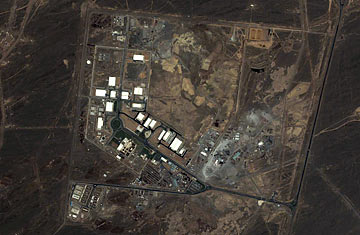
The Natanz nuclear facility in Iran
China is pouring cold water on the Obama Administration's push for more sanctions on Iran if there's no progress in nuclear talks with Tehran this month. Beijing says dialogue, not new sanctions, is the way to go, casting doubt on Washington's ability to win U.N. Security Council endorsement for the new sanctions it hopes to impose as the penalty for Iran's refusal to engage positively with Western negotiation offers.
Wu Jianmin, a top foreign policy adviser to the leadership in Beijing, told journalists in New York on Thursday that China believes "that Iran should not possess the bomb, but it has the right to get peaceful nuclear energy."
"The Chinese are by nature very reluctant to [impose] sanctions because past experience shows they do not work," he added. "The best way is the dialogue."
Wu, a former ambassador to France, is a member of the Chinese Foreign Ministry's advisory group on policy and is regarded as one of Beijing's top foreign policy thinkers.
Another senior Chinese diplomat, Lv Fengding, added that Western nations need to "convince Iran that its best interest is not to possess nuclear weapons." But that cannot be done, he said, until "we look at the root cause: [Iranians] don't feel safe; they feel the need to protect themselves."
President Barack Obama has warned Tehran that if it fails to respond positively to the most recent Western offer of talks before the end of this month, it will face an escalation of sanctions. And Administration officials aren't expecting Iran to seriously engage.
The signals from Tehran have been mixed: President Mahmoud Ahmadinejad said on Sept. 7 that talks on the nuclear issue were "finished." The following day, his government presented a package of new proposals aimed at resolving the dispute with the "P5+1" group, which features the five permanent members of the U.N. Security Council (the U.S., Britain, France, Russia and China) and Germany. But the proposals are long on generalities about global issues and short on specifics addressing concerns that Iran's nuclear-energy program will put within reach the means to build nuclear weapons.
U.S. officials now say Tehran is inching closer to having the capacity to build a bomb. "We have serious concerns that Iran is deliberately attempting, at a minimum, to preserve a nuclear-weapons option," U.S. Representative Glyn Davies told the board of governors of the International Atomic Energy Agency (IAEA) yesterday. "Iran is now either very near or in possession already of sufficient low-enriched uranium to produce one nuclear weapon if the decision were made to further enrich it to weapons-grade."
Iran's current enrichment efforts are conducted under IAEA monitoring and intended to create low-enriched uranium suitable for reactor fuel but not for weapons. Although it has produced enough of that material to create fuel for a single nuclear bomb if it were reprocessed to a higher level of enrichment, doing so would require that Iran declare its intent by kicking out IAEA inspectors and reconfiguring its enrichment facilities, which would take a number of months. Creating the other elements of a deliverable nuclear weapon would take even longer. Still, the Obama Administration is eager to prevent Iran from accumulating the capacity for a "breakout" option, in which civilian nuclear infrastructure is quickly transformed for purposes of bomb production.
Yet the Obama Administration's threat of new sanctions carries little weight if such a move is opposed by veto-wielding permanent members of the U.N. Security Council, which include China and Russia. Beijing and Moscow have restrained previous sanctions efforts against Iran, and Wu's statements in New York suggest that China hasn't changed its mind.
"Americans are too impatient," the Chinese foreign policy adviser said. "We have to talk to the Iranians. This is the best way to solve our differences."
